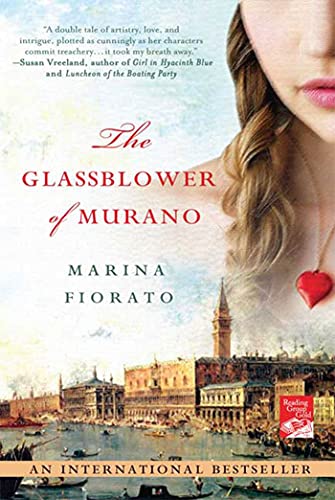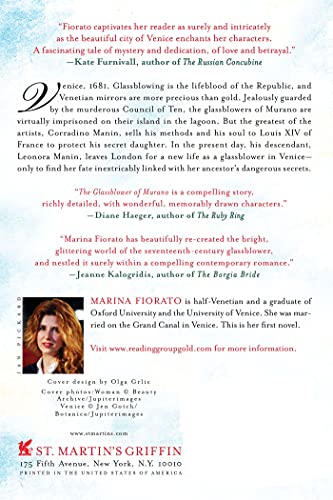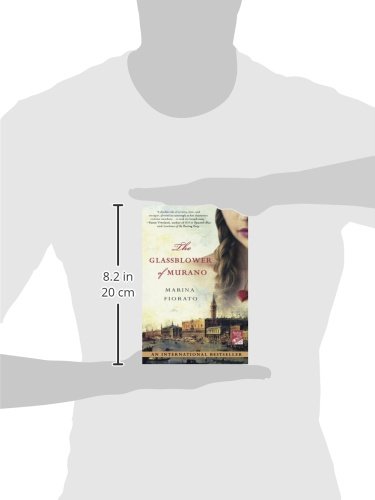



Marina FioratoThe Glassblower of Murano
P**S
A look into Venice's past and present
The Glassblower of Murano is by Marina Fiorato. It is a mystery and a romance in beautiful Venice of today and of old. The narrator’s view goes between that of Corradino Manin of 1700’s to that of Lenora Manin of the present. Venice and the island of Murano are the settings of this wonderful novel.Corradino Manin is the only known survivor of his family’s massacre by The Ten in Venica. He was denounced by his own brother as a traitor to Venice. As soon as he put the note in the Lion’s Mouth, Ugolino regretted putting his brother’s name in and immediately went to Corradino and told him The Ten were after him and he and his family needed to run. They ran to the Island of Murano to catch a French boat to France; but the killers found them and killed them on Murano. All but Corradino who had stopped on his way home to see what was going on in the glassblower’s shed. Here, he was given small jobs to do and soon became as dirty as the rest of the young boys who helped. When the killers came looking for him, Giacomo, the glassblower, kept his identity a secret and thus saved him. Corradino had an aptitude for glassblowing which made him a magnificent blower and one to be watched with awe. As he grows up in Venice, he has a secret which to share would mean death. What is his secret and with this secret, would he become a traitor?Lenora Manin grew up in England as the only daughter of Elinor Manin, an academic who specialized in Renissance Art. She had visited Venice during her studies and met and married Bruno Manin, a boatman who told her of his illustrious ancestor, Corradino Manin. They lived happily in Venice until the birth of their daughter Lenora. Elinor wanted to return to England but Bruno did not. She was very upset when she heart he died of a heart attack soon after they had left Venice. She continued to raise Nora on her own. When Nora married Stephen Carey, they honeymooned in Italy. She loved it but Stephen did not. While in school, Nora became entranced in the art of glass blowing and learned the techniques herself. She became quite good. When her marriage to Stephen grew to an end, she decided to go to Venice and become apprenticed on Murano to learn the ultimate in glassblowing as well as to search for her ancestor Corradino.How will Venice treat her? Will she be accepted in Venice and on Murano?
T**A
Lovely historic fiction but...
My favorite genre to read is either history or historic fiction. I love Venice and my husband and I are glassblowers. So needless to say I was thrilled to see this title. I very much enjoyed this story and the visions that were conjured of Venetian life, past and present. The historic facts are well done. But, I MUST take issue with the very idea of a glassblower working 1200 +/- degree hot glass with a bare hand! Can't be done...you would not only loose your fingerprints, but your entire hand! Also, the notion that any glassblower would work with hot glass barefoot!? No chance. There is so much broken glass and accidents are an unfortunate part of the art, that no one would be barefoot. I understand authors take artist liscense, but this book is beautiful and these two glaring issues would not change the story or make it more "romantic". It is a good read and may make you want to visit Venice even more. Great book for the flight to the most fabulous city in the world. (yes, I am bias).
I**Z
Beguiled by 17th Century Venice!
I have always loved books that live in two worlds - the present and the past. Those stories bring home the fact of how closely we are connected to the people who came before us, and how their actions in the past still influence our lives in the present. And if you take this philosophy to heart, you will realize our responsibility as a people whose present actions shape the future.The Glassblower of Murano is one such book that lets us travel back in time with the young protagonist Leonora Manin. She leaves behind an unhappy relationship and moves to Venice, the city of her ancestors, to build a new life. But it's not a new life she finds; instead she finds the life she was meant to live. Following in the footsteps of her famous Venetian ancestor, glassblower Corradino Manin, Leonora finds her life's work in that profession.The author drew me into the mystery of the past as we get to know Corradino and care about his life. What is his secret? Is he a traitor, and if so, who is he protecting? Who are The Ten? Intrigue, murder, suspense - all of it kept me reading.As I became completely beguiled by 17th century Venice, the present-day story of Leonora paled by comparison. Still, the Glassblower of Murano is a great read!
M**M
divulging the mysteries of Venetian glass (3 1/2 stars)
This book focuses on 2 stories in Venice, one in the present day about Leonora Manin, a glass artist who leaves her home in London after a divorce precipitated by the pressures of infertility, and the second story of her ancestor Corradino Manin, a famous glassblower of the island of Murano. Leonora goes to Venice in hopes on learning more about her father, who met her mother while she was on vacation in Venice, to learn more about his side of the family, and to hopefully apprentice at a glass studio. The historical story is told partly in flashback and is interwoven with Leonora's. Leonora finds history repeating itself as she becomes the focal point of the glass studioscPR campain due to her famous ancestor and begins to fall in love with a Venetian man. I found the historical story to be far more intriguing and believable than the current day story. Is Corradino a traitor? What happened to his daughter in the Pieta orphanage? Leonora story never quite comes together and comes perilously close to a cliche. Overall, a good, but not great story.
H**N
Have you been to Venice?
If you have been to Venice & walked the canals & visited the Island of Murano, then you will love walking the canals again through this story. Very interesting story about glass blowing in Murano & the people who did it. this held my interest from start to finish, loved the character development, the location & the history. Had been waiting for a great price for kindle, got it & don't regret!!!
B**M
Mixed feelings, but an okay read.
I have very mixed feelings about this book. The author has evidently conducted a significant amount of historical research, which I enjoyed and which is impressive; yet she never seems to integrate it quite well enough into the story, and for me, at points, it felt more of a history lesson than part of the plot. Even so, I enjoyed the historical story far more than the modern parallel. The characters were more three dimensional and believable, with Corradino's human flaws engendering empathy and believability. In contrast, Leonora and Allessandro were cliched and rather lightweight, and never really came alive for me. In fact, I found myself feeling rather it titter wiith Leonora at times. I found the descriptions of Venice, past and present, very colourful and interesting, and the various aspects of glassmaking were fascinating. Several points really grated though. The word for word repetition of Chapter 1 in Chapter 38 made me feel quite cheated. Why? To fulfil the word count? The frequent cliches did nothing to enhance the writing style, nor did the really annoying over-use of the word 'peerless', to the point where I felt if I encountered it just one more time, I would scream. Similarly, the confusion of use of tne word 'ancestor' rather than 'descendent', grated. Frequent errors in the timeline was another thing that took the polish away from this book. What is so frustrating is that the premise for this novel was very interesting and engaging, and with a little careful proof-reading, editing and a thorough re-write, an acceptable story could have evolved into a great, memorable read. I realise this was an early book for this author, written some time ago, so I would certainly give her another try. Hopefully, time and experience will have honed her writing skills into something far worthier of her original concepts,
L**R
Disappointed
Many books I've read recently seem to have been set in a dual timeframe with a historical timeframe being brought to life by a parallel modern day tale; The Glassblower of Murano is one such book.The novel opens in 17th Centure Venice with Corradino Manin returning to Venice with the knowledge that he is about to die, he is shortly stabbed in the back by one of his own blades. The story of Corradino is then told to us following his life from when he was a small child and then tracing the actions which have led to the point of his death. The modern day story follows Leonora Manin, a descendent of Corradino who has moved to Venice following the breakdown of her marriage.The story line of this book was very good and I did enjoy it, however, I felt that for much of the time Marino Florato was trying too hard. I think that if she relaxed a bit more and let the writing flow more naturally the book would be a more enjoyable read, instead I felt that she was trying to make this into a literary novel by trying to emulate the written language of the 17th Century. Due to the writing style that I struggled to read this book, it took me over two weeks (which for me is a ridiculously long time) and I did get to the stage where I was getting so frustrated that I almost abandoned it.I never formed a bond with either of the main characters which is also unusual for me, I enjoy reading as I love to get lost in someone else's world and this never happened with this book, I found that I didn't really care what happened to either of them.Another frustrating thing about the book is how the timelines shifted in a way that implied the author had forgotten what point they were at; a pregnancy is just announced and then the months in between are passed over in a sentence; Corradino is to have his daughter join him in a month and then suddenly this changes to 12 months but with no explanation. Simple inconsistencies like this I found to be quite irritating and I ended up having to look at the earlier sections of the book questioning what I had previously read (not easy when reading this on a Kindle).One the plus side, I thought the last quarter of the book picked up a lot and I enjoyed this far more than the earlier sections, it came full circle and had closure on all of the separate threads, although this did also mean that the ending was quite predictable I (admittedly we already knew what happened to Corradino).This isn't going to go down as one of the best books that I've read this year but it wasn't that bad that I wouldn't consider another of Floprato's books as I'm hoping that with experience she'll relax more and future works will be more enjoyable.
K**W
A great read
I found this book completely absorbing, as another reviewer has said, I actually found myself googling Corradino Manin to check whether he was a real character from history. I have been to Venice a couple of times and this book really recreates the feel of the city; not surprising as the author is half venetian! The book swiches between the modern and the historical as the modern day descendant of Manin gradually unravels the mystery of the past; the outcome of which will have a profound affect on her. I definately want to read more books by this author now.One slight criticism I have is that the opening chapter is repeated word for word towards the end of the book, except for a few paragraphs at the end. I don't know if this was intentional or not; it is true that now that chapter carries meaning that we couldn't understand at the beginning of the book, but I still didn't want to read it all over again. Not a big problem, I skipped through it until I reached the extra lines.A very good read!
N**S
Venice sinking, surely not
I visited Venice once on my honeymoon and my wife and I swore we would return. This book has strengthened that promise in me, as it has given me an altogether new, or perhaps ancient, perspective on the most beguiling of cities.I loved this book with its intertwining parallels of history and present day, its well researched details on glass making and the workings of Murano. The story is interesting, intriguing and gripping. There's a number of criticisms from other reviewers that I might echo, but for me this does not distract from the storytelling. Leonora's character is well crafted as is that of her ancestor Corradino, and the myriad of connections between them build and twist and bind the parallels compellingly together. The insights into the Venetian setting and its treasures were an added bonus.A lovely read that I thoroughly enjoyed.
K**0
Good holiday reading
I downloaded this book to read on holiday without really knowing anything about it - it turned out to be a really good read with insights (which I hope are accurate) into the Murano glassworkers community.The storyline is perhaps a little too full of fortunate coincidences - the heroine just happens to meet all the right people who will give her a coveted job, find her the one apartment in the whole of the city which just happened to belong to her ancestor, become the love of her life, practically as soon as she arrives in Venice; but if this hadn't happened so quickly, the story wouldn't have moved on.I liked the way that history repeated itself over the centuries and thought the book as a whole was engaging, interesting and worth reading - a good story.
Trustpilot
3 weeks ago
2 months ago